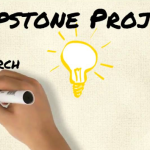Writing a capstone project is a significant milestone in one’s academic journey. Whether you’re pursuing an undergraduate or graduate degree, a capstone project allows you to apply the knowledge and skills gained throughout your program to a real-world problem or question. However, crafting a remarkable capstone project requires careful planning, thorough research, and effective communication. In this article, we present you with ten indispensable tips to help you write a compelling and impactful capstone project.
1. Choose a Captivating Topic:
Selecting an engaging and relevant topic is crucial for a successful capstone project. Consider your personal interests, career aspirations, and the subject area you want to explore further. Aim for a topic that motivates and excites you, as it will make the research and writing process more enjoyable and rewarding.
2. Conduct Preliminary Research:
Before diving deep into your capstone project, conduct preliminary research to gain a broad understanding of your chosen topic. Familiarize yourself with key concepts, existing literature, and relevant research. This will enable you to identify knowledge gaps and refine your research questions.
3. Define Clear Objectives and Research Questions:
Clearly define the objectives and research questions for your capstone project. The objectives should outline the purpose of your study, while the research questions will guide your investigation and provide structure to your project. Ensure that your objectives are specific, measurable, achievable, relevant, and time-bound (SMART).
4. Create a Detailed Outline:
Developing a comprehensive outline is crucial to organize your capstone project effectively. Break down your project into logical sections, including an introduction, literature review, methodology, findings, analysis, and conclusion. A well-structured outline will keep you focused and ensure a coherent flow of ideas throughout your project.
5. Conduct Thorough Research:
Thoroughly researching your topic is essential for producing a high-quality capstone project. Utilize credible sources such as academic journals, books, and reputable websites to gather information and support your arguments. Take meticulous notes and properly cite all your sources to avoid plagiarism.
6. Analyze and Synthesize Information:
Once you have gathered sufficient research material, analyze and synthesize the information to develop a cohesive understanding of the topic. Identify patterns, trends, and key findings that will contribute to your project’s originality and depth. Use critical thinking skills to evaluate the strengths and weaknesses of existing research.
7. Develop a Strong Methodology:
The methodology section of your capstone project outlines the approach you took to conduct your research. Clearly explain the research methods, tools, and techniques you employed to collect and analyze data. Ensure that your methodology aligns with your research questions and provides a robust foundation for your findings.
8. Present Clear and Concise Writing:
Effective communication is paramount in a capstone project. Present your ideas, arguments, and findings in a clear and concise manner. Use simple language, avoid jargon, and structure your sentences and paragraphs logically. Revise and proofread your work meticulously to eliminate any grammatical or spelling errors.
9. Incorporate Visual Aids:
To enhance the clarity and visual appeal of your capstone project, consider incorporating appropriate visual aids. Tables, graphs, charts, and infographics can help present complex data or concepts in a more accessible format. However, use visual aids sparingly and ensure they are relevant and add value to your project.
10. Seek Feedback and Revisions:
Lastly, seek feedback from your advisor, professors, or peers throughout the writing process. Their constructive criticism and suggestions can greatly improve the quality of your capstone project. Be open to revisions and willing to make necessary adjustments based on the feedback received. A fresh pair of eyes can often spot areas that need improvement or provide valuable insights that you may have overlooked.
So, go ahead and embark on your capstone project journey armed with these valuable tips. Success awaits as you demonstrate your ability to apply what you’ve learned throughout your academic career and make a meaningful contribution to your field of study.
Conclusion:
Writing a remarkable capstone project requires careful planning, extensive research, and effective communication. By following these ten essential tips, you can ensure that your capstone project stands out and makes a lasting impact. Remember to choose a captivating topic, conduct thorough research, define clear objectives and research questions, create a detailed outline, analyze and synthesize information, develop a strong methodology, present clear and concise writing, incorporate visual aids when appropriate, and seek feedback throughout the process.
Embarking on a capstone project is a significant undertaking, but with dedication, perseverance, and the right approach, you can create a project that showcases your knowledge, skills, and academic growth. Use this opportunity to delve deep into a subject you are passionate about, contribute to the existing body of knowledge, and leave a lasting impression on your academic community.




